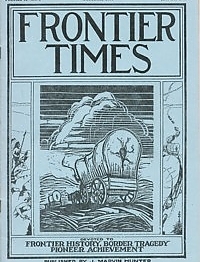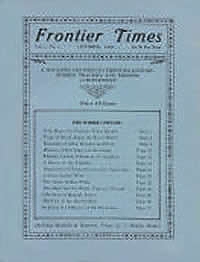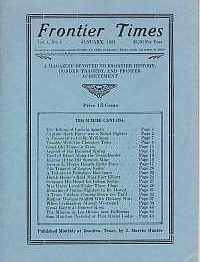By using our website, you agree to the use of cookies as described in our Cookie Policy
Magazines & Instant Downloads
Vol 12 No. 01 - October 1934
Ben Thompson and Billy Sims
by Captain J. B. Gillett. Mentions lesser known details regarding the exploits of notorious Ben Thompson and his long standing association with Billy Sims who was born and raised in Austin, and was a childhood companion with Thompson.
Further Mentions: Professor Sivaticoat's private school, Miss Molly Sims, George Burns, Theodore Hillyer, Jack Harris, King Fisher, Miss Molly Moore, Jim Moore. Mrs. Forster's private school, L. E. Edwards, old Shanghai Pierce, Jim Burditt., Mark Wilson, Phil Coe and Tom Bowles, Wild Bill Hickok, Brown Paschal and John Holland, two old Alpine cattlemen,
Location of National Capital at Washington
Susie Gentry. Hard to believe that a good dinner was the primal cause of the establishing of our permanent seat, of government at Washington, D. C., but such is the fact, according to this article. After a hard fought battle between northern and southern concerns. "Thomas Jefferson knew the soothing, almost sedative effects of a good dinner on the nerves of strenuous politicians, and he invited Alexander Hamilton as his guest on this notable occasion. The Southern States were firm in their opposition to Hamilton's financial scheme, and could count a majority of two against it. The result of the dinner was a conversation of Lee and White of Virginia to the proposal of Hamilton and, on the other hand, Hamilton of New York and Robert Morris of Pennsylvania agreed to…"
John McMullen Went To California In 1849
C. C. SMITH, offers letter of interest to Frontier Times and makes interesting notes and clarifications regarding Irish pioneers John McMullen, James McGloin
Texas Owes Freedom to Man Named Smith
By T. B. Baldwin. THE SIGHT OF the Lone Star flag should always recall to mind a noted Texas patriot and statesman. He belonged to the famous house of Smith, known near and far the world over. This particular member was Governor Henry Smith, a native of Kentucky, who took the trail for Texas in 1821, when about 33 years old. After spending some time on the northern border of Texas in the pioneer settlements along Red River he became a permanent resident of the municipality of Brazoria, where to anticipate this story somewhat, Henry Smith had the good (or ill) fortune to become the first Governor of the then Mexican Province of Texas. Further Mentions: Battle of Velasco Mr. Polly, Anahuac, Velasco, Copano, Nacogdoches and San Antonio. Capt. John Austin, Domminie Ugartechea, the consultation at San Felipe, Coahuila, Elisha M. Pease, Yoakum, Charles B. Stewart, Lieutenant Governor Robinson., Col. John C. Neill, H. S.,Kimball, George C. Childress, David G. Burnet, Lorenzo de Zavala of Harris, John Forbs , the village of Chief Bowles of the Cherokee tribe
American Indians Were Brave, Says Trail Driver
By Alina Ward Hamrick. Notable trail driver and Texas Ranger, A. L. McCoy, describes the typical American Indian as well trained, disciplined and brave. He recounts in this great story, his service with the Texas Rangers in the company of Capt. John Alexander with Bill Shelburn as sergeant. This company did much to rid the country of the bad men found in so many localities in those days. Counties served by these minutemen were Burnet, Lampasas, Llano and San Saba, with' possibly others adjoining receiving their services also. . Headquarters for the Ranger force in which Mr, McCoy served were at Underhill Springs in Burnet Cotinty. He well remembers the neighboring Packsaddle Indian fight which took place in Llano County in the early eighties.
Further Mentions: Mack Pryor, well-known Texas rancher who was a brother to Col. Ike T. Pryor of San Antonio. Hugh and W. R. McCoy, Burnet; A. L. McCoy, San Saba; F. W. McCoy, Menard; A. F. McCoy, Brady; B. J. McCoy, Haskell; J. R. McCoy, Shinnook, Mont.; W. H. McCoy, Mrs. Vina Stewart, and Mrs. S. J. Riggs, Burnet.
Expedition Through Texas in 1854
by W. B. Parker. The first installment in a series of lengthy and detailed articles where the author shares his experiences while attached to the expedition commanded by Captain R. B. Marcy, to explore Northwest Texas in the Summer and Fall of 1854. Fascinating eye-witness & day-by-day journal of events on early frontier.
Further Mentions: the Big Washita and Brazos rivers, Captain French, Dr. G. G. Shumard,
When Prairie Fire Was Fire
Account of the fires that once plagued the Texas panhandle and the means the pioneers and ranchers used to fight them. Mrs. Timmons,
Salt, Lotteries, and the American Revolution
By Laura Ratchford Fromme, Elgin, Texas. Resourceful politicians use of means to provide for advancement of Colonies. Letters in University of Texas tell the tale. Further Mentions: Lutcher Stark, Mr. Joseph Palmer of Braintree, John Leacock,
When David Crockett Borrowed Money
By John S. Mayfield. This article is great Crockett history. It is not known whether the colorful and courageous David Crockett of Tennessee, who sacrificed his life as a private soldier at the Alamo for Texas independence in 1836, was the type of person to strive to "keep up with the Smiths or the Joneses;" probably he was not, but anyway, it is now known that he, like so many other office holders, was not above borrowing. This is the account of little-known document written and signed by great Alamo defender. The document itself, written entirely by Crockett and signed by him, reads as follows: "Washington, Feb. 17, 1829. $700. Sixty days from date, I promise to pay Bob M'Hatton, or order, seven hundred dollars, for value received payable at the office of Discount & Deposits. David Crockett". On the reverse side appear the individual signatures of Bob McHatton, Wm. Brent, Jas. Clark, Duncan McArthur, W. W. Seaton, and Seth Hyatt, as guarantors of the loan. The notation in red ink "5045, David Crockett, 700, 21 April 1829" indicates that Crockett paid' the note almost within the limited time. Little did he realize as he made the final settlement of the debt that seven years from that very day at a place 1500 miles distant, his death was to be avenged by a small army of Texans on the battlefield of San Jacinto.
Further Mentions: James Buchanan from Pennsylvania, later President, John Randolph of Virginia, who had participated in a harmless duel with Henry Clay, and James K. Polk, on the Tennessee delegation with Crocket, who later became President. In the Senate were Daniel Webster from Massachusetts, Thomas H. Benton from Missouri, Robert Y. Hayne from South Carolina, Martin Van Buren from New York, and John Tyler from Virginia, the last two of whom later became President. But what about these men who signed the note with Crockett? Who were they? A bit of research discloses the fact that they were by no means insignificant so unimportant people. First, there is Bob McHatton from whom Crockett borrowed the money and who also endorsed the note as a guarantor. Millatton was a … Robert Lytle McHatton, William Leigh Brent, James Clark, Duncan McArthur, General Josiah Harmer's expedition against the Miami Indians, the famous Battle of Captina, in 1792. General William Henry Harrison, William Winston Seaton, Joseph Gales, Captain John Davidson's regiment, Seth Hyatt, grandfather of Alpheus Hyatt who was one of the most famous naturalists of this country.
A Privateer of the Western Plains
Account of resourceful, albeit somewhat dubious manner of financing a military endeavor, Col. Jacob Snively was authorized by the Republic of Texas to provide for the needs of 300 horsemen from the commerce of Mexico and those traversing the desert.
An excerpt: In due time the lieutenant returned with the commandant of the force, Col. Jacob Snively. The colonel promptly presented his credentials, a commission from acting secretary of war, Mr. B. Hamilton, of the republic of Texas. In it at the direction of President Sam Houston, Snively Was authorized to equip, arm and provision a troop of not more than 300 horsemen, who were authorized to prey on the commerce of citizens of Mexico traversing these plains. He was to convoy the plunder to Red River w1rere it was to be divided equally between Snively and, his troop op the one hand and the republic of Texas on the other. He was particularly admonished not to interfere with the commerce of the friendly republic of the United States or to transgress its territory. In short, Mexico and Texas were still at war. The officials of the latter. to recoup losses of their own citizens at the hands of the Mexicans, had issued these letters of marque and reprisal, this privateersman's commission, to prey on the commerce of Mexico traversing the "high seas" of the old untamed West. Further Mentions: Pawnee Rock, Coon Creek, Cooke,
History of Kenney's Fort
By L. W. Kemp. Great early history of Williamson county, and the events surrounding the establishment of Kenney’s Fort. Article mentions: the south bank of Brushy Creek at its juncture with Dyer's Creek, Mr. J. H. Griffith of Taylor, "The first settlers in Williamson county," Mr. Griffith, wrote, "located principally along the San Gabriel and Brushy. The pioneers had already established homes at Webberville and Hornsby's Bend on the Colorado and at Port Sullivan and Nashville-on-theBrazos. These, were the nearest settlements to Williamson county and many settlers came into the new county from these localities. Indians at this time infested the country and made frequent raids on the settlers. The government of the Republic built a blockhouse fort in 1838 near where Cedar Park is now located on the headwaters of Brushy creek. The fort was garrisoned by rangers, but when they were called to aid in the revolution, it was destroyed by the Indians and never rebuilt. Further Mentions: important Indian battle which occurred on Cottonwood Creek, five miles south or where Taylor now stands, in 1839, Manuel Mores, Lieutenant James 0. Rice, the massacre of John Webster, town of Leander, Hornsby's Bend, Dr. Thomas Kenney, Mary Jane Kenney, their three children, Mary Jane, Clarissa and Onna., Captain Robert A. Coleman, Joseph Weeks, Captain Merrill, a small stream at a crossing known as Bone Hollow, Col. W. K. Makernson, George Wilkins Kendall, Dr. Chalmers, Brigadier General Hugh McLeod, Colonel William G. Cooke, Dr. Richard F. Brenham, Jose Antonio Navarro, Palo Duro Canyon, William P. Lewis, Samuel W. Howland, Alexander Baker and William Rosenberry, Captain J. S. Sutton, Thomas S. Lubbock, First Lieutenant of Captain Ratcliffe's Company
Greetings From Bigfoot Wallace
"Letter" from the Texas Hero himself! Includes great old B&W photo of Wallace. (actually a pitch by FT to purchase the book, "Adventures of Bigfoot Wallace" – but great reading: An excerpt: "I was thrown into a filthy Mexican prison, where I languished for months and suffered all the cruelties the Mexicans were capable of heaping upon a helpless prisoner. At last I was freed through friends I had in the United States, and I came back to Texas, and settled on the Medina river near Castroville, where I was kept busy keeping the Indians from getting my scalp. When the Mexican war came on I hastened to the front and took my place in the ranks, and Lordy, how I spilled Mexican gore! When the Mexican war ended, and the Mexicans had been gloriously whipped I went back to my cabin on the Medina, and there remained for many years scouting and trailing and fighting Indians, and…"
$4.95
‹ Back








